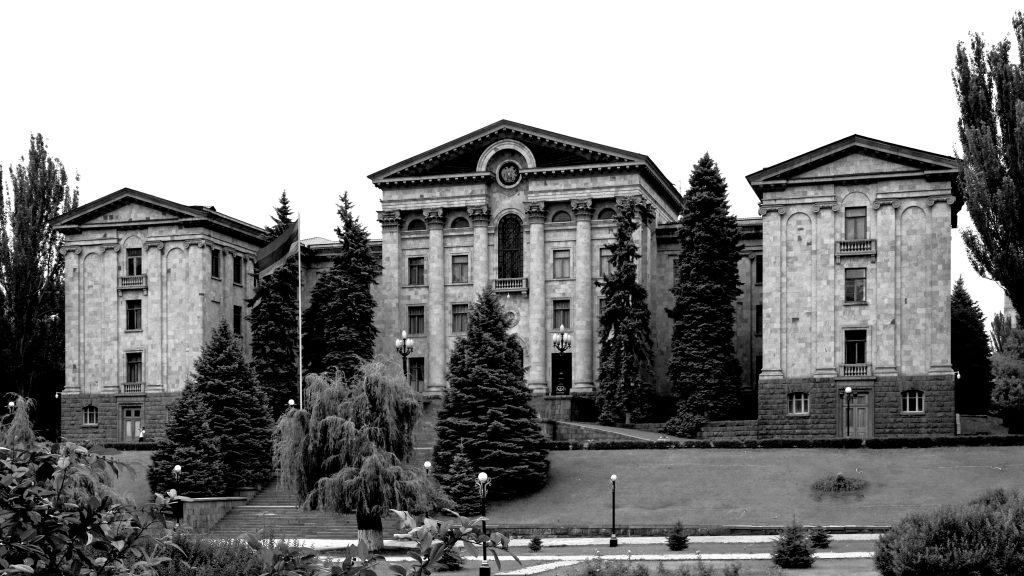YEREVAN—The National Assembly of the Republic of Armenia issued the following statement on Feb. 28, on the 30th anniversary of the massacre of the Armenian population of Sumgait.

Building (Photo: Marcin Konsek)
***
Acknowledging that:
Thirty years ago, the Sumgait pogrom was planned and perpetrated by the Azerbaijani authorities. The act was yet another manifestation of Azerbaijan’s consistent policy of extradition and extermination of the Armenian people from its cradle—a policy that has commenced since Azerbaijan’s establishment in 1918, through the massacres of 30,000 Armenians in Baku (1918) and 20,000 Armenians in Shushi (1920);
This policy continued in the Soviet era through the forcible eviction of Armenians of Nakhijevan and other regions, as well as repressions against the Armenians of Artsakh. This process gained momentum, particularly with the massacres committed against the Armenians in Sumgait, Baku, and Gandzak (Kirovabad) from 1988 to 1991, and, since 1991, with the large-scale aggression against Artsakh;
The attacks on Artsakh have involved:
- the use of thousands of mercenaries, who are closely related to various international terrorist organizations;
- the ethnic cleansings and deportations of 22 Armenian villages through the “Koltso” (Ring) military operation in 1991;
- the killings of elderly citizens and of women and children living in Maragha village of Artsakh in 1992;
- the occupation and de-Armenization of the Shahumyan region and part of Martakert region in 1992;
- the killing of the population of the town of Khojaly near Aghdam committed by Azerbaijani armed groups with the aim of using it for the internal power struggle in Azerbaijan and attributing it to the Armenians;
- the glorification of those who committed crimes against Armenians;
- the disseminating of anti-Armenian hatred and intolerance;
- the annihilation of the Armenian historical-cultural heritage;
- the falsification of history; the violation of the 1994-1995 trilateral ceasefire agreements, which have no time limitation;
- subversive penetrations;
- the killing of peaceful population and the military personnel;
- the targeted bombings of civilian infrastructure;
- and finally, a large-scale offensive against Artsakh in April 2016, which was accompanied with gross violations of international humanitarian law, namely, the killings of children, women, and elderly citizens, the mutilation of corpses of soldiers, and the beheading of captured Armenian soldiers in the style of terrorist groups.
Acknowledging that in Feb. 1988, under the threat of ethnic cleansing, depopulation, and physical extermination, the people of Artsakh—in accordance with the norms and principles of international law and in line with the existing legislation at that time and one of the fundamental principles of international law, namely, the equality and self-determination of peoples—resorted to peaceful demonstrations, since Azerbaijani authorities’ anti-Armenian propaganda and resulting violence, massacres, and deportations of the Armenian people, had made Armenian life in Azerbaijan impossible;
Acknowledging that the Azerbaijani authorities, opposing the efforts of the international community and the Organization for Security and Cooperation in Europe (OSCE) Minsk Group Co-Chairs, undermine the negotiation process on the settlement of the Nagorno-Karabagh conflict and continue to rely on the use of force and threat of force;
The National Assembly of the Republic of Armenia:
- Condemns the mass violence, murders, and deportations of the peaceful population by Azerbaijan, as well as the Armenophobic, racist policy and the aggressive military actions unleashed against Nagorno-Karabagh;
- Commemorates the innocent victims of Azerbaijani crimes against Armenians;
- Calls on Parliaments and the Parliamentary Assemblies, international organizations, and human rights bodies:
- To condemn Azerbaijan’s committed and ongoing atrocities against the peaceful population and its violations of the humanitarian law, which threaten not only the Armenian people, but also the security, stability, and development of the whole region;
- To undertake practical steps to prevent them.



Be the first to comment